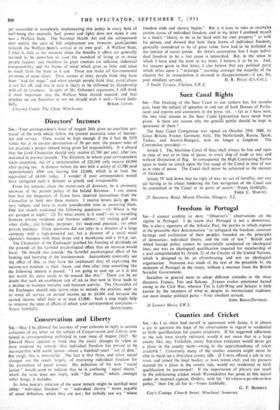Directors' Incomes
S1R,—Your correspondent's letter of August 24th gives an excellent por- trayal of the evils which follow the present excessive rates of income- tax and sur-tax.. These would be high enough if the £ had ito 1939 value, but at its current devaluation of 50 per cent. the present rates of tax preclude a proper reward being given for responsibility. It is absurd that the Lord Chancellor should only receive £1,700 per year, after tax, reckoned in pre-war pounds. The directors, to whom your correspondent takes exception, out of a remuneration of £20,000 only receive £4,000 after paying tax. A director before the war with a salary of £2,500 paid approximately £500 tax, leaving hint £2,000, which is at learst the equivalent of £4,000 today. I wonder if your correspondent would have castigated such a director as greedy and irresponsible.
From his remarks about the motor-cars of directors, he is obviously unaware of the present policy of the Inland Revenue. I can assure him that the Inspectors of Taxes have received instructions from the Chancellor to look 'into these matters. I receive letters dailyt this very subject, and have to waste considerable time in answering 'them. One last month contained the following questions:—(1) Where is the car garaged at night? (2) To what extent is it used?—(i) in travelling between private residence and business address ; (ii) visiting golf and other clubs ; iiii) holiday purposes ; (iv) week-end pleasure ; (v) other private journeys. These questions did not refer to a director of a large company with a high-powered car, but a director of a small retail chemises business with three shops and a warehouse and a 10-h.p. car.
The Chancellor of the Exchequer justified his freezing of dividends on the grounds of the harmful psychological effect that an increase,would have. He should also conside:. the harmful psychological effect of his hunting and ha'rrying of the business-man. Accountants constantly see the effect of this, as they have the unpleasant duty of explaining the income-tax position to their clients. and dine, after time something like the following remark is passed: "I am going to ease up, as it is just not worth the extra strain to be treated like this." There can be no doubt that such an exorbitant rate of tax as that now in force leads to a decline in business morality and business activity. The Chancellor of the Exchequer should take active steps to remedy the position, such as to remit all sur-tax on earned income up to £4,000 and increase the earned income relief limit to at least £3,000. Such a step might help to improve the state of affairs of which your correspondent complains.—


































 Previous page
Previous page